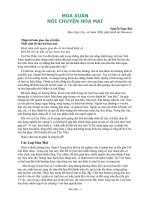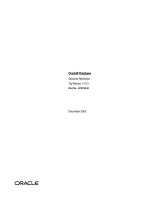Tài liệu Securitized products ppt
Bạn đang xem bản rút gọn của tài liệu. Xem và tải ngay bản đầy đủ của tài liệu tại đây (53.36 KB, 2 trang )
Securitized products
The income-generating assets of a company are pooled separately from its
balance sheet into a special-purpose vehicle (SPV), and the SPV issues a
security backed by the cash flow to be generated by such assets and sells the
security to investors. This method is called "securitization." And the security issed
through such a proces is generally called a "securitized product." Business
enterprises use their assets- such as auto loans, mortgage loans, lease
receivables, business loans, and commerical real astate- as collateral to back up
their securitized products. As defined by the Asset Liquidization Law, intellectual
property (such as copyrights and patents) also can be securitized.
When viewed from the standpoint of asset holders, securitization of assets has
the advantage enabling them to use the proceeds of the assignment or sale of
such assets they get at the time of issue in lieu of cash flow that may be
generated by the assets over a future period of years. In other words, asset
holders can convert uncertain incomes into a real fund. At the same time, the
practice offers asset holders the advantage of freeing them from the risk of a fall
in the price of their assets. In addition, in case any holder of a piece of less liquid
commercial ral estate wants to issue a security by putting up such ral estate as
collateral, such asset holder may easily sell the security by issuing it in small
denominations to atract a larger number of small investors.
When viewed from the standpoint of investors, securitized products give them an
additional choice of investment that have a new character. More specifically, first,
a security backed by a piece of ral estate gives them an opportunity to invest in
real estate that otherwise they cannont afford to buy outright with a small sum of
money. Secon, as asset holders can issue different grades of securities (the
"senior/subordinated structure") at one and the same time by controlling credit
risks, they offer investors the opportunity to purchase a security that meets their
needs.
Basic mechanism of issuing securitized products
Generally, many of the securitized products are issued through a mechanism
describled belw. First, the holder of assets ("originator")- real estate and account
receivable- that are to be securitized are assigned to a SPV. By ssigning them to
the SPV, such assets are separated from the balance sheet of the originator and
become assets of the SPV. An SPV takes the form of an association, a trust, a
special purpose company (SPC), or a special -purpose trust, and most of the
SPVs take the form of an SPC. To ensure the bankruptcy remoteness (to hold
the SPC harmless even when its owner goes bankrupt), the originator using the
SPC formula generally establishes an overseas SPC that a charitable trust that
uses a declaration of trust- a system unique to the Anglo-Saxon law- has, and
then establises a domestic SPC as a subsidiary of such overseas SPC. Those
who have a debt to the originator are called "original obligors."
The next step is to formulate terms of issue of a securitized product to be issued
by the SPV. If the originator opts for the trust method, it issues beneficiary
cerfificates of a trust company. If it chooses the SPC method, it issues the kinds
of securities the SPC decides, but it does not have to issue them on one and the
same terms of isse. In short, it can design each with a different character by
differentiating the orderof priority with respect to the payment of interest and
redemption of principal, by varying maturities, or by offering the guarantee of a
property and casualty insurance company. By adding such wrinkles, the
originator can issue securities that meet the diverse need of investors. And
securities are called in terms of the order of priority for payment "senior security,"
"mezzanine security," or "subordinated security."
When the originator plans to sell its securitized products to an unspecified large
number of investors, it should make them readily acceptable to investors by
offering them objective and simple indicators (credit ratings) for independently
measuring risk involved in its securitized products. In addition, there are other
players involved in marketing securitized products, such as back up servicers,
who manage the assets underlying the securitized prodcts and recover funds
under commission from the SPV, and bond management companies, which
manage securitized products (corporate bonds) purchased by investors. Firms
that propose such mechanism for securitizing assets and coordinate the issuing
and the sale of such products are called "arrangers," and securities companies
and banks often act as arrangers.
Japan Securities Research Institute









